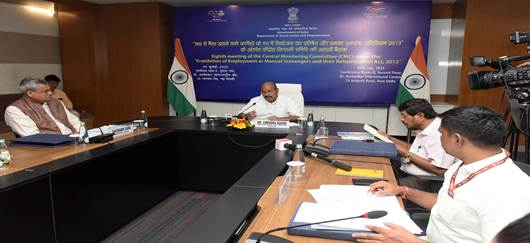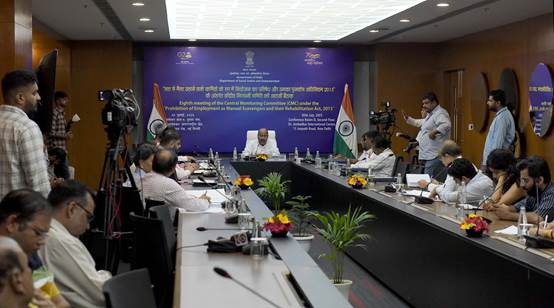Ministry of Social Justice & Empowerment
The Ministry of Social Justice and Empowerment organises Eighth Meeting of Central Monitoring Committee to review the Implementation of MS Act 2013
Posted On:
05 JUL 2023 5:44PM by PIB Delhi
Dr. Virendra Kumar, the Union Minister of Social Justice and Empowerment, chaired the eighth meeting of the Central Monitoring Committee at Dr Ambedkar International Centre,
New Delhi, today, to review the implementation of the "Prohibition of Employment as Manual Scavengers and their Rehabilitation Act, 2013" (MS Act, 2013). This important Central Act was enacted by the Parliament in September, 2013 and has come into force in December, 2014. It aims at complete elimination of the manual scavenging in its various manifestations and comprehensive rehabilitation of the identified manual scavengers. The meeting was attended by the Union Minister of State for the Ministry of Social Justice and Empowerment, Shri Ramdas Athawale, Chairman, National Commission for Safai Karamcharis, Secretary, DoSJE, Principal Secretaries/Secretaries of States and representatives from the Central Ministries/Departments/Commissions.

During the review meeting discussions were held on the mobile app “Swachhata Abhiyaan” launched by the Ministry of Social Justice and Empowerment on 24.12.2020 to capture the data of insanitary latrines still existing and manual scavengers associated with them. The app can be downloaded free from the Google Play Store. The Committee noted that anyone can upload information about instances of existence of insanitary latrines or practice of manual scavenging. The Committee noted with satisfaction that every alleged such instance uploaded on the App over the past 3 years had been individually investigated and no evidence of the existence of any insanitary latrines or manual scavenging were found.
The Committee noted that with the conversion of most of the insanitary latrines into sanitary latrines under Swachh Bharat Abhiyan, the problem of manual scavenging eliminated. Presently there is no evidence of the continuation of the practice of manual scavenging.
All States/Districts have been requested to declare their district free from manual scavenging. As on date, such confirmation from 520 districts out of 766 districts in the country has already been received. The Committee suggested to follow up with the remaining districts.

The Committee was informed that the Ministry of Social Justice and Empowerment initiated two surveys of manual scavengers in the year 2013 and in the year 2018. During these surveys, a total of 58,098 eligible manual scavengers had been identified and all of them have been provided the One Time Cash Assistance of Rs. 40,000/-. Out of these, 22,294 willing identified manual scavengers/dependants have been provided Skill development training and Capital Subsidy has been released in respect of 2,313 manual scavengers/dependants who have availed bank loans for self-employment projects. In addition to this, 641 Safai Karmacharis and their dependents have been sanctioned capital subsidy for sanitation related projects to minimise death during sewer and septic tank cleaning.
The Committee was informed that the main focus now would be on ensuring that all activities related to the cleaning sewers or septic tanks are done by using protective gear and mechanical cleaning devices while ensuring the observance of the requisite safety precautions.
For this purpose, National Safai Karamcharis Finance & Development Corporation has already held 1,177 workshops till date for the staff of municipalities and contractors to sensitize them about mechanized cleaning of sewers and septic tanks and the provisions of MS Act, 2013 and MS Rules, 2013.
Further, to eliminate hazardous cleaning, stop deaths of sewer and septic tank workers and ensure their safety and dignity, Ministry of Social Justice and Empowerment and Ministry of Housing and Urban Affairs have jointly formulated a Scheme namely National Action for Mechanised Sanitation Ecosystem (NAMASTE). The scheme will be implemented in all 4800+ Urban Local Bodies (ULBs) of the country, during the three years up to 2025-26 with an outlay of Rs. 349.70 crore. In order to implement NAMASTE scheme, following actions need to be taken by States/UTs and ULBs:
- Sensitization of ULBs for implementation of NAMASTE and follow up.
- Ensure nomination of Responsible Sanitation Authority (RSA) in each District.
- Ensure setting up of Sanitation Response Unit (RSU) in each large ULB.
- Operationalize helpline number in each SRU.
- Profiling of Sewer and Septic Tank Workers (SSWs) through MIS portal.
- SHG formation of sewer/septic tank workers for sanitation related projects.
- Providing work assurance to sanitation workers for Sanitation Related Projects.
- Nomination of officers/State Mission Directors at State level/ULB level.
- Training of sewer entry professionals and SRU staff.
- Personal Protective Equipment (PPE) for sewer entry professionals.
- Awareness generation in ULBs.
- NAMASTE interventions to be evaluated under Swachchh Servekshan.
- Uploading the details of machinery and specialised workers for hazardous cleaning on the portal of ULBs.
The Committee noted the components of the NAMASTE scheme and suggested that the activities be pursued vigorously to ensure that every local authority uses the appropriate technical appliances for cleaning of sewer and sceptic tanks effectively.
The Committee was apprised that wherever any tragic death occurs due to non-observance of safety precautions, the matter regarding payment of compensation to the families of victims is done expeditiously and the filing of FIRs against agencies responsible for such negligence regularly pursued with the States. The Committee noted that such instances have been falling and directed that the objective of Zero deaths in such sanitary cleaning activities be achieved at the earliest.
********
AKN/RK
(Release ID: 1937570)
Visitor Counter : 3286